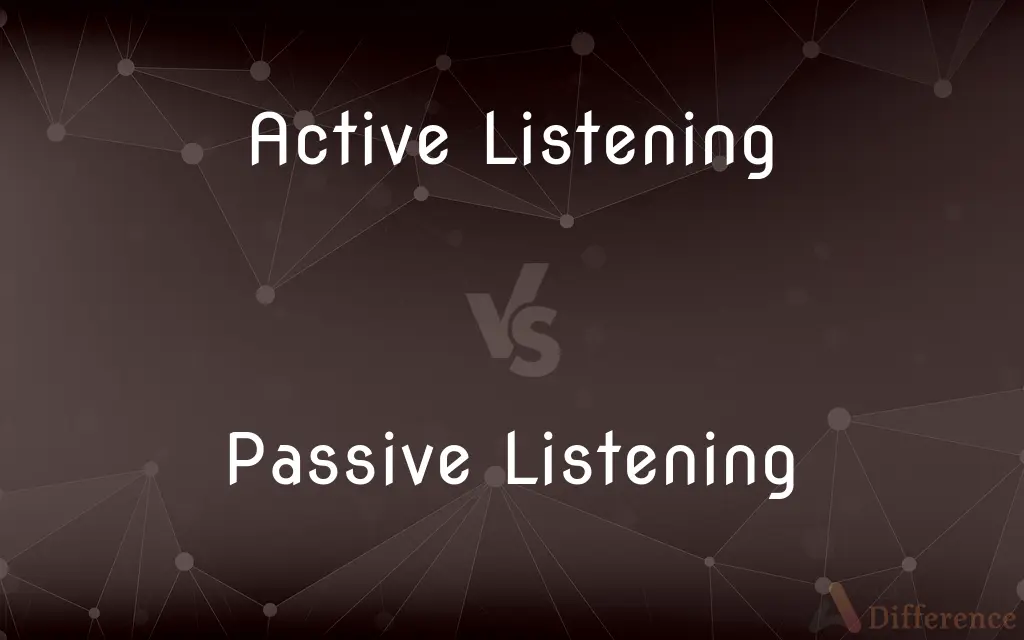Active Listening vs. Passive Listening — What's the Difference?
By Tayyaba Rehman — Published on October 3, 2023
Active Listening involves fully focusing, understanding, and responding to a speaker, whereas Passive Listening is the detached, non-reactive hearing of spoken words without focus or response.

Difference Between Active Listening and Passive Listening
Table of Contents
ADVERTISEMENT
Key Differences
Active Listening and Passive Listening are differentiated by the level of engagement and response to the heard information. Active Listening is a communication technique where the listener fully focuses, understands, remembers, and responds to the other person's words. It requires full attention and the listener often gives feedback to the speaker. Conversely, Passive Listening is when the listener doesn’t engage or respond to the speaker's message and may not retain the shared information, representing a lack of effort or intent to understand the communicated message.
Tayyaba Rehman
Oct 03, 2023
The purpose of Active Listening is to acquire information, understand perspectives, and resolve issues, making it crucial in settings like counseling, negotiations, and conflict resolution. Active listeners demonstrate attention through verbal and non-verbal cues, such as nodding and paraphrasing. In contrast, Passive Listening is often unintentional and habitual, occurring in casual, non-critical settings, where understanding and retention of information are not priority, and listeners may appear indifferent or distracted.
Tayyaba Rehman
Oct 03, 2023
Active Listening facilitates effective communication and understanding, enriching relationships, and fostering cooperation and empathy. It contributes to better learning and problem-solving by actively engaging with the information received. On the other hand, Passive Listening, due to its non-engaging nature, may lead to miscommunications, misunderstandings, and a lack of depth in interpersonal relationships, with potential negative impacts on learning and problem resolution.
Tayyaba Rehman
Oct 03, 2023
Active Listening requires effort and intention, employing techniques like summarizing, questioning, and reflecting to confirm understanding and show engagement. Passive Listening is devoid of such effort and intention, with the listener playing a more subordinate role in the communication process, without employing techniques to enhance understanding or show engagement, potentially hindering effective communication.
Tayyaba Rehman
Oct 03, 2023
Active Listening is not just hearing but involves understanding and interpreting the information being communicated. It implies participation in the communication process, employing reflective and empathetic listening, requiring mental effort to process the information received. In contrast, Passive Listening is characterized by a lack of participation and mental engagement. It involves merely hearing the words spoken without processing or interpreting the meaning, and often results in forgotten or misunderstood information.
Tayyaba Rehman
Oct 03, 2023
ADVERTISEMENT
Comparison Chart
Level of Engagement
High engagement with focus and response
Low engagement without focus or response
Tayyaba Rehman
Oct 03, 2023
Purpose
Understand perspectives and resolve issues
Non-critical, unintentional listening
Tayyaba Rehman
Oct 03, 2023
Communication
Involves verbal and non-verbal feedback
Lacks feedback and appears indifferent
Tayyaba Rehman
Oct 03, 2023
Impact on Relationships
Enriches relationships and fosters cooperation
May lead to misunderstandings and lack of depth
Tayyaba Rehman
Oct 03, 2023
Mental Effort
Requires effort to process information
Involves minimal mental engagement
Tayyaba Rehman
Oct 03, 2023
ADVERTISEMENT
Definitions
Active Listening
A communication technique focusing on understanding and remembering spoken words.
Through Active Listening, individuals can gain deeper insights into the speaker’s thoughts and feelings.
Tayyaba Rehman
Oct 01, 2023
Passive Listening
Represents a detached, non-reactive form of listening.
Passive Listening in lectures may lead to poor understanding and retention of the subject matter.
Tayyaba Rehman
Oct 01, 2023
Active Listening
It facilitates effective communication and mutual understanding.
Active Listening can resolve conflicts by allowing parties to feel understood and valued.
Tayyaba Rehman
Oct 01, 2023
Passive Listening
Characterized by a lack of participation and mental engagement.
Passive Listening can occur when one is distracted and not mentally present during a conversation.
Tayyaba Rehman
Oct 01, 2023
Active Listening
Involves demonstrating attention through verbal and non-verbal cues.
In Active Listening, nodding and maintaining eye contact are essential to show attentiveness.
Tayyaba Rehman
Oct 01, 2023
Passive Listening
May lead to miscommunications and lack of depth in relationships.
Relying solely on Passive Listening can result in misunderstandings and strained relationships.
Tayyaba Rehman
Oct 01, 2023
Active Listening
A fully engaged and responsive form of listening.
Active Listening involves paraphrasing the speaker’s words to confirm understanding.
Tayyaba Rehman
Oct 01, 2023
Passive Listening
It occurs unintentionally and habitually in non-critical situations.
Casual conversations often involve Passive Listening, as the focus is not on retention of information.
Tayyaba Rehman
Oct 01, 2023
Active Listening
Requires mental effort to process and interpret received information.
Active Listening in lectures enhances learning and retention of knowledge.
Tayyaba Rehman
Oct 01, 2023
Passive Listening
The act of hearing words without focus, engagement, or response.
Passive Listening often leads to forgotten or misunderstood information.
Tayyaba Rehman
Oct 01, 2023
FAQs
Can Passive Listening lead to misunderstandings?
Yes, Passive Listening can often result in misunderstandings due to the lack of engagement and response.
Tayyaba Rehman
Oct 03, 2023
What is the main focus of Active Listening?
Active Listening focuses on fully concentrating, understanding, remembering, and responding to the spoken words.
Tayyaba Rehman
Oct 03, 2023
Can Passive Listening have a negative impact on relationships?
Yes, Passive Listening can potentially lead to a lack of depth and miscommunications in relationships due to the absence of active engagement.
Tayyaba Rehman
Oct 03, 2023
How is Passive Listening characterized?
Passive Listening is characterized by a lack of focus, engagement, and responsive behavior to the communicated message.
Tayyaba Rehman
Oct 03, 2023
Is Active Listening a mental or physical activity?
Active Listening is primarily a mental activity, requiring focus, attention, and cognitive processing to understand and interpret the received information.
Tayyaba Rehman
Oct 03, 2023
Is Passive Listening mentally engaging?
Passive Listening typically involves minimal mental engagement, often leading to forgotten or misunderstood information.
Tayyaba Rehman
Oct 03, 2023
Does Active Listening involve providing feedback to the speaker?
Yes, Active Listening often involves providing verbal and non-verbal feedback to the speaker to show understanding and engagement.
Tayyaba Rehman
Oct 03, 2023
Is Passive Listening usually intentional?
No, Passive Listening is usually unintentional and occurs when the listener is not actively engaging with the communicated information.
Tayyaba Rehman
Oct 03, 2023
How does Active Listening impact relationships?
Active Listening can significantly enrich relationships by fostering cooperation, mutual understanding, and respect.
Tayyaba Rehman
Oct 03, 2023
Is Passive Listening effective for learning new information?
Passive Listening is generally not effective for learning new information as it lacks the active engagement required for processing and retaining new knowledge.
Tayyaba Rehman
Oct 03, 2023
Is Active Listening important for effective communication?
Yes, Active Listening is crucial for effective communication as it fosters understanding and mutual respect between communicators.
Tayyaba Rehman
Oct 03, 2023
Can Active Listening resolve conflicts?
Yes, Active Listening can play a crucial role in resolving conflicts by enabling individuals to feel heard, understood, and valued.
Tayyaba Rehman
Oct 03, 2023
Does Active Listening require effort and intention?
Yes, Active Listening requires conscious effort and intention to understand and respond to the speaker appropriately.
Tayyaba Rehman
Oct 03, 2023
In what situations is Passive Listening common?
Passive Listening is common in casual, non-critical situations where understanding and retention of information are not the primary focus.
Tayyaba Rehman
Oct 03, 2023
Author Spotlight
Written by
Tayyaba RehmanTayyaba Rehman is a distinguished writer, currently serving as a primary contributor to askdifference.com. As a researcher in semantics and etymology, Tayyaba's passion for the complexity of languages and their distinctions has found a perfect home on the platform. Tayyaba delves into the intricacies of language, distinguishing between commonly confused words and phrases, thereby providing clarity for readers worldwide.

















































